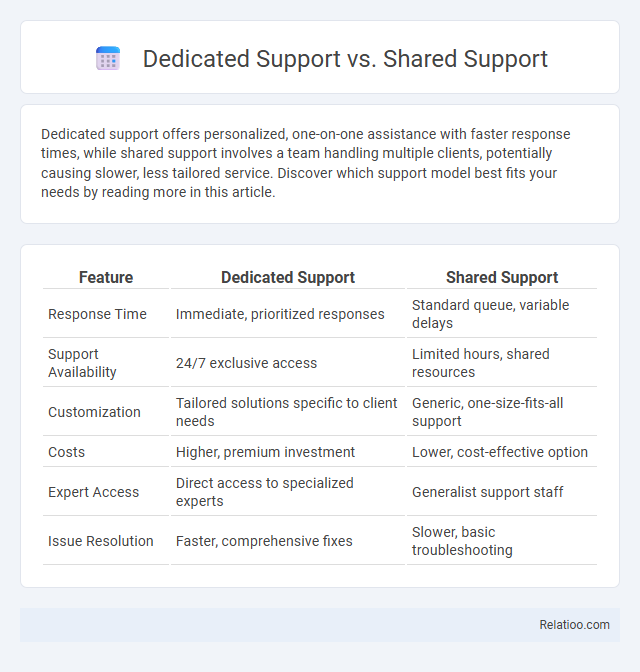Dedicated support offers personalized, one-on-one assistance with faster response times, while shared support involves a team handling multiple clients, potentially causing slower, less tailored service. Discover which support model best fits your needs by reading more in this article.
Table of Comparison
| Feature | Dedicated Support | Shared Support |
|---|---|---|
| Response Time | Immediate, prioritized responses | Standard queue, variable delays |
| Support Availability | 24/7 exclusive access | Limited hours, shared resources |
| Customization | Tailored solutions specific to client needs | Generic, one-size-fits-all support |
| Costs | Higher, premium investment | Lower, cost-effective option |
| Expert Access | Direct access to specialized experts | Generalist support staff |
| Issue Resolution | Faster, comprehensive fixes | Slower, basic troubleshooting |
Introduction to Dedicated vs Shared Support
Dedicated support provides a single point of contact and personalized assistance tailored to one client, ensuring faster response times and deeper understanding of specific needs. Shared support involves multiple clients accessing the same support resources, which can reduce costs but may lead to longer wait times and less customized service. Choosing between dedicated and shared support depends on factors such as budget, required service level, and the complexity of the issues needing resolution.
Key Differences Between Dedicated and Shared Support
Dedicated support offers exclusive access to specialized personnel focused solely on a single client's needs, ensuring faster response times, personalized solutions, and higher accountability. Shared support involves a team managing multiple clients simultaneously, which can reduce costs but often leads to slower responses and less customized service. The primary difference lies in resource allocation and attention level, with dedicated support providing tailored assistance and shared support offering a more generalized approach.
Business Needs Assessment: Which Model Fits?
Dedicated support offers tailored expertise and exclusive resource allocation, ideal for businesses with complex, high-priority needs requiring consistent oversight. Shared support provides cost-effective solutions by distributing resources among multiple clients, suitable for organizations with standard maintenance demands and limited budgets. Resource-based models deliver flexible access to specialized skills on demand, fitting businesses with fluctuating project requirements needing scalable technical assistance.
Cost Comparison: Dedicated vs Shared Support
Dedicated support typically incurs higher costs compared to shared support due to exclusive access to specialized personnel and resources, ensuring faster response times and tailored solutions. Shared support spreads expenses across multiple clients, reducing individual costs but potentially resulting in slower response times and less personalized service. Evaluating cost efficiency depends on the organization's need for immediate and customized assistance versus budget constraints and acceptable service levels.
Scalability and Flexibility Considerations
Dedicated support offers the highest scalability and flexibility by allocating exclusive resources tailored to specific business needs, enabling seamless adjustments during growth or peak demand periods. Shared support leverages pooled resources across multiple clients, which can limit scalability due to divided attention but provides cost-effective flexibility for smaller or less complex operations. Resource-based models prioritize adaptive allocation of personnel or infrastructure, balancing scalability and flexibility through dynamic resizing based on workload fluctuations and project requirements.
Service Quality and Response Times
Dedicated support ensures higher service quality and faster response times by allocating specific personnel exclusively to one client, minimizing delays and maximizing expertise. Shared support divides resources among multiple clients, which can lead to slower responses and generally lower service quality due to competing demands. Resource-based support varies based on availability but often lacks the consistency and priority inherent in dedicated setups, impacting overall responsiveness and support effectiveness.
Security and Data Privacy Aspects
Dedicated support offers enhanced security and data privacy by providing exclusive access to your systems and eliminating risks associated with shared environments. Shared support, while cost-effective, may expose your data to vulnerabilities due to multiple clients accessing the same resources, increasing the risk of unauthorized access or data breaches. Your choice should prioritize dedicated support to ensure strict compliance with security protocols and safeguard sensitive information effectively.
Use Cases for Dedicated Support
Dedicated support is ideal for enterprises requiring consistent, expert technical assistance, complex project management, and rapid issue resolution, ensuring minimal downtime and tailored services. Use cases include large-scale software deployments, mission-critical infrastructure maintenance, and custom application development where specialized knowledge and priority response are essential. Shared support suits smaller businesses with budget constraints and less urgent needs, while resourced support is beneficial for temporary projects demanding flexible skill sets.
Use Cases for Shared Support
Shared Support is ideal for small businesses or startups that require cost-effective customer service solutions without the need for dedicated personnel. Your team benefits from scalable assistance handling common inquiries, technical issues, or basic troubleshooting across multiple clients simultaneously. This model excels in environments where demand fluctuates and consistent, yet flexible, support is essential.
Choosing the Best Support Model for Your Organization
Choosing the best support model for your organization depends on factors such as budget, project complexity, and scalability needs. Dedicated support offers personalized assistance with a team focused solely on your projects, ensuring faster response times and deeper expertise, while shared support provides cost-effective access to a pooled team handling multiple clients simultaneously. Resource-based models allow flexible staffing tailored to specific skill requirements, making it essential to evaluate your organization's priorities for responsiveness, customization, and cost-efficiency before deciding.

Infographic: Dedicated Support vs Shared Support
 relatioo.com
relatioo.com